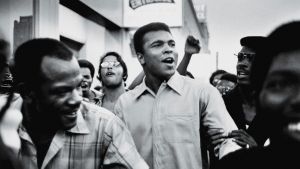The Trials of Muhammad Ali (2013)
The Trials of Muhammad Ali was released on May 5, 2013. in the USA. The American film was produced by Kartemquin Films. The movie storyline was directed by Bill Siegel. The movie was displaying the battle of Muhammad Ali outside the boxing ring concerning race, religion, and wartime dissent[1].
Plot

Ali has been a controversial figure before the refusal to serve in the Vietnam war. After winning the gold medal in the 1960 Olympics, he climbs his way to the first rank of heavyweight boxing. He expresses his ideas and uses his fame to fight for equal rights for African Americans. Later on, he decides to convert to Islam and follows Minister Elijah Muhammad, and befriends Malcolm X and Martin Luther King Jr. He becomes a hero to African American communities as he does not hesitate to fight the prejudice towards minorities in public. The main point of the movie was the exile of Ali for refusing army induction. His title is stripped, banned from boxing championship in every state, and harassed by many people including African Americans. Though he is imprisoned for 5 years, he fights for justice, gives public speaking to earn equal rights, and in the end, Ali paid the price. He becomes one of the most admired athletes in the world for taking a stand despite the relentless path that he has to take[3].
Black Empowerment
As the film shows, Muhammad Ali wants to give influence on fighting for equal rights. Thus, he explores many paths throughout his journey including conversion to Islam. In the Nation of Islam, he sees African Americans with their good-looking clothes are proud of organizing and dedicating their life to make a real difference for African Americans and their belief[4]. Even though his boxing champion titles and boxing rights were stripped due to the refusal to be draft in the Vietnam war, he fights for his rights as he says in public "you my opposer when I want freedom, you my opposer when I want justice, you my opposer when I want my right equality, you won't even stand up for me in America for my religious beliefs and you want me to go somewhere and fight but you won't even stand up for me here at home". Yet he paid the price despite the harassment he got, he acquired the Medal of Freedom in 2005 given by President George W. Bush Jr.[5].The film also features John Carlos, a track and field legend, that gives a Black Power salute at the 1968 Olympics. The film tries to portray not only Muhammad Ali's life, but it also wants to show African Americans and minorities in America demonstrate the racial and ideological rally in the 1960s[6].
Controversy
Louis Farrakhan, Leader of the Nation of Islam, says "Ali was exemplifying freedom of most black people did not enjoy"[7]. Despite the fame that Ali has, he is despised by many people for refusing army induction to serve in Vietnam. Ali believes that the Vietnam war also a way for the government to dismiss the Africa Americans especially him as he says "the domination of white slave masters over dark people the world over". It showed where he expresses his vision and ideology is seen as controversies as the successful "African American" who was not to be grateful, while what he only wants is just equal rights for everyone [8]
References
- ↑ The Trials of Muhammad Ali (2013). IMDb. Retrieved January 17 2021
- ↑ The Trials of Muhammad Ali The Hollywood Reporter. Retrieved January 17 2021]
- ↑ The Trials of Muhammad Ali. RogerEbert. Retrieved January 17 2021
- ↑ Review: ‘The Trials Of Muhammad Ali’ Indiewire. Retrieved January 17 2021
- ↑ The Trials of Muhammad Ali (2013) | Do This For A Living YouTube. Retrieved January 17 2021
- ↑ 'The Trials of Muhammad Ali' Review Nonfics. Retrieved January 17 2021
- ↑ The Trials of Muhammad Ali Official Trailer #1 (2013) - Documentary Movie HD YouTube. Retrieved January 17 2021]
- ↑ TFilm Review: ‘The Trials of Muhammad Ali’ Variety. Retrieved January 17 2021]